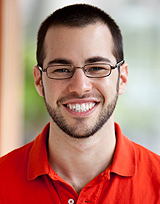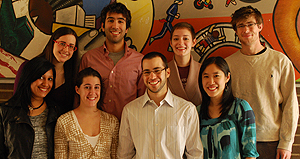

Combating Obesity & Diabetes
Ross Kristal: Establishing a BODY of Work to Combat Obesity & Diabetes
While the explosion of diabetes is making headlines the world over, a group of Einstein students is taking the fight against obesity and diabetes to the streets of the Bronx. Spearheaded by first-year student Ross Kristal, the newly established student club Bronx, Obesity, Diabetes and You (BODY) has ambitious goals and a wide- ranging agenda that they hope will change lives in the Bronx as well as the mindset of the community-at-large.

Ross KristalThe group has identified three major initiatives they plan to undertake — working on exercise and nutrition with elementary school children at P.S. 89; establishing a community garden on the grounds of Einstein’s neighbor, the Jack D. Weiler Hospital; and engaging Bronx community leaders through grassroots outreach to effect educational efforts that can help change attitudes and improve health.
“I am amazed at what Ross and the other students have accomplished so far and that they have chosen to focus on type 2 diabetes, which most people don’t care as much about,” said Dr. Meredith Hawkins, director of the Global Diabetes Initiative and professor of medicine at Einstein, who mentored Mr. Kristal during a summer research project he completed before starting his medical education.
To Mr. Kristal, it all makes perfect sense. “I think that type 2 diabetes is going to be one of the biggest health problems our country faces in the future,” he said, “and we must reach out to the community and start making a difference now.”
He added, “On a health policy level, obesity and diabetes present serious health challenges that have major consequences. Most of us know someone in our personal lives who suffers from diabetes and, as practitioners, we are going to see increasing numbers of patients impacted by it.”
For Mr. Kristal, the issue of diabetes is indeed personal. Diagnosed with type 1 at age seven, he knows firsthand what it is like to deal with a chronic disease.
“I feel for these people. I know what they are going through, and, it kills me. They don’t have to be going through it. Type 2 diabetes is preventable and reversible.”
Mr. Kristal’s strategy for tackling type 2 diabetes in the Bronx is tactical and deliberate, borne out of his background in both business and science. To get started, he recruited a small group of fellow first-years to hash out a strategic plan and identify specific objectives.
What Is Type 2 Diabetes?
Type 2 diabetes is the most common form of diabetes, which usually is associated with being overweight and does not require insulin for survival.“We didn’t want to just go into the South Bronx and advocate,” he explained. “It wouldn’t be very effective for students in their 20s to go out in the community, hand out flyers and not see anyone again. We really want BODY to be action-oriented within the community and make an impact.”
In tackling the club’s school-based education initiative, Kristen Meier and Debby Yanes created “Healthy Schools Initiative,” through which they teach physical activity classes twice a month to students, ages 5 to 13, who attend the school’s otherwise sedentary afterschool program. They also hold a nutrition seminar twice per semester.
During their first activity session in early March, they taught the children a dance routine. “We just get active with them and it’s really, fun,” said Ms. Meier. “The kids love it!”
Heading up the community garden effort are Emily Guh and Lindsey Fuller. Their goal is to get approval for creating a small plot adjacent to the hospital grounds that could be ready for planting this spring.
“We hope to create a community at the hospital for patients, students, staff and local residents that centers on healthy eating and knowing where your food comes from,” explained Ms. Fuller.
BODY’s third initiative is its most ambitious — changing long-held attitudes and behaviors throughout the entire community. “Although more people are becoming aware of the problems of obesity and diabetes, the hardest thing to change is the culture,” said Mr. Kristal. For example, at parties, we need to stop serving chips and dip and start serving vegetables. How do you get people to do that? It has to be a lifestyle change.”

The board of BODY, Einstein’s Bronx, Obesity, Diabetes and You club (from left): Debby Yanes, Mariah Rabin, Kristin Meier, Ryan Boudreau, Ross Kristal, Lindsey Fuller, Emily Guh and Tony BowenTo effect that change, BODY members will be looking to the Bronx’s community and religious leaders who can bring the message home to their constituencies and congregations. “People tend to listen to those they look up to,” he said.
The group plans to host an outreach conference for these community leaders, to provide them with the tools for educating those around them and to keep the effort going throughout the entire community.
The Bronx community is part of what drew Mr. Kristal to Einstein, in connection to his deep interest in public health issues. “I’m concerned about the uninsured population, as well as the high rates of obesity and type 2 diabetes, and that influenced my decision to come here,” he said.
The problem, according to Dr. Joel Zonszein, professor of clinical medicine at Einstein and director of Montefiore’s Clinic Diabetes Center, comes from a combination of poverty, limited education, culture and the environment. Speaking at BODY’s inaugural event, he noted, “Type 2 diabetes is affecting a younger and younger population. When you go to the pediatric clinic in the Bronx, nearly half of the children now have diabetes.”
He added, “For type 2 diabetes, prevention is much more important and effective than any treatment.”
BODY is hoping to bring that message of prevention to the diverse populations of the Bronx. With their strategic plan in place and the first of three initiatives underway, the club has begun to get the message out.
“When I got to Einstein, I was struck by the amazing contributions our researchers and clinicians make in addressing the issues of obesity and diabetes,” said Mr. Kristal. “It seemed that we students could do something meaningful to contribute, too.”
“This kind of extra-curricular activity gives students something we can never foster just by sending them to class,” agreed Dr. Hawkins. “This gives them the ability to touch people’s lives.”
Posted on: Tuesday, March 29, 2011

Tablet Blog